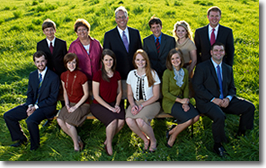Reflections from a week of Evangelistic Meetings
28 03 2011 During the week of March 20-25th Steve Pettit and his evangelistic team joined us for a week of meetings. Through the week we enjoyed beautiful sacred music, a number of gospel messages, and heart-oriented topical preaching. It required a lot of effort on our part as a church to host this week. It was also a long week that kept many families out night after night and resulted in some weary church members on the Sunday after. With all of these things in mind I have given thought today to the value of a week of meetings and why we would do it again. Here they are:
During the week of March 20-25th Steve Pettit and his evangelistic team joined us for a week of meetings. Through the week we enjoyed beautiful sacred music, a number of gospel messages, and heart-oriented topical preaching. It required a lot of effort on our part as a church to host this week. It was also a long week that kept many families out night after night and resulted in some weary church members on the Sunday after. With all of these things in mind I have given thought today to the value of a week of meetings and why we would do it again. Here they are:
1. There is value in having gospel oriented services for our church to bring visitors to.
2. There is value in the “saturation” of the Word of God in our lives. We get regular preaching on Sunday’s and Wednesday’s but a full week of preaching is beneficial.
3. There is value in “topical” preaching about the basics of our Christian lives. We cannot live on a steady diet of topical preaching, but a week of messages that are directed at certain areas of our lives is valuable.
4. There is value in having a different voice (the evangelist) saying the same thing the pastor is saying regularly. It reinforces the truth being regularly heard, and some listen more carefully when they hear a different voice.
5. There is value in a church hearing well prepared, God-honoring music.
6. There is value in a week of concentrated effort letting our community know that our church exists.
7. There is value in our children and teens seeing a group of college age young people dedicating their lives to serving the Lord.
8. There is value in the encouragement that an evangelist gives to a pastor.
9. There is value in a church being encouraged to think “decisionally.”
10. There is value in a church working hard together to serve a team of evangelist that are serving us.
Alot of work went into last week. I’m so proud of our church and the way you attended, served, and responded to the preaching of God’s Word. The testimony service on Sunday gave further evidence to the power and value of a week of meetings.
I’m already looking forward to the next time we have a team through!
For Him,
Pastor Ron



 God has graciously given Faith Baptist Church a wonderful group of teens. More importantly God has given our church a wonderful group of parents who are raising teens. Last night the parents of our teens shared their burdens, and prayer requests for their teens in a meeting with Pastor Kaighen and myself.
God has graciously given Faith Baptist Church a wonderful group of teens. More importantly God has given our church a wonderful group of parents who are raising teens. Last night the parents of our teens shared their burdens, and prayer requests for their teens in a meeting with Pastor Kaighen and myself.


